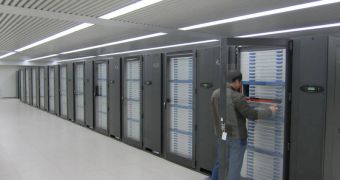When it comes to computing, there aren't that many awards as prestigious as holding the “World's fastest supercomputer” title, China's Tianhe-1A supercomputer managing to surpass everything that the US and the rest of the world could muster, snagging this title from Cray's Jaguar HPC located at the Oak Ridge National Lab in Tennessee.
The Tianhe-1A managed to achieve this record by using a whopping 14,336 Intel Xeon processors and 7,168 Nvidia Tesla M2050 GPUs in order to deliver 2.507 petaflops, as measured by the Linpack benchmark, besting the 2.3 petaflop Cray Jaguar supercomputer operated by the Oak Ridge National Lab in Tennessee.
Together with this high level of performance, however, also comes an pretty hefty energy bill, the Tianhe-1A consuming an impressive 4.04 megawatts, although this number pales in comparison with the 12 megawatts that would have been required to build a similarly performing system using only CPUs.
As Nvidia like to state, the difference in energy is enough to provide electricity to over 5000 homes for a year, so you could actually call this a “green” (in more ways then one) supercomputer.
And if you wonder what all this power will be actually used for, the Tianhe-1A will be operated as an open access system for large scale scientific computations, whatever that may mean.
"The performance and efficiency of Tianhe-1A was simply not possible without GPUs," said Guangming Liu, chief of National Supercomputer Center in Tianjin.
"The scientific research that is now possible with a system of this scale is almost without limits; we could not be more pleased with the results."
So yeah, China's got the “World's faster supercomputer” title for now, but care to bet how much will hold it for?
As fast as things evolve in the high performance computing world I doubt that it will be to long until some University, research institute or other institution of this sort will come out boasting its achievement.
End of it all, I think that only one question still remains: Can it run Crysis?

 14 DAY TRIAL //
14 DAY TRIAL //